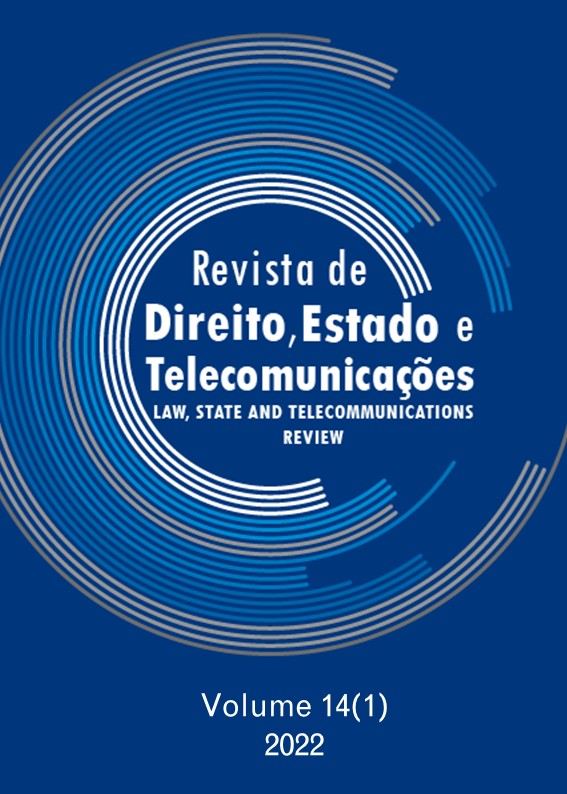Digital Ruble
Assessing the Criminological Risks of the Proposed Model
DOI:
https://doi.org/10.26512/lstr.v14i1.40388Palavras-chave:
Digital Currencies of Central Banks. Digital Ruble. Regulation. Criminological Risks. Digital Law.Resumo
[Purpose] The article deals with the prospects of introducing the digital ruble within the territory of the Russian Federation.
[Methodology/Approach/Design] The methodological basis of this study is a set of methods of scientific knowledge, among which the main place is taken by the methods of historicism, consistency, analysis and comparative law. Having conducted a detailed review of global trends in this area, authors identified the main reference points that are relevant for most countries where pilot CBDC projects are being implemented.
[Findings] The analysis of the key report, issued by the Central Bank of Russia, on the prospects for introducing the digital ruble allowed us to assess the architecture of the models proposed by the Central Securities Market, their advantages, and their disadvantages.
[Practical Implications] Taking into account the assessment of statistical indicators on the Russian crime rate, the state of Russian criminal legislation, the concerns of institutional market participants, and the positions of mega regulators around the world, a criminological analysis of the potential risks of introducing the digital ruble was made.
[Originality] The results of the study will be useful to both legal scholars who deal with issues of comparative law, and for practical specialists. the article provides detailed explanations about the theoretical and applied aspects of the introduction of the digital ruble. For the first time, the authors gave a theoretical justification for the risks associated with the introduction of a digital currency.
Downloads
Referências
Not applicableALMAKUNOVA R. (IN PRESS) The conclusion is made: the theft of money from accounts in 2020 doubled. 13 Oct. 2020 Available at: https://iz.ru/1072799/roza-almakunova/vyvod-sdelan-krazhi-deneg-so-schetov-v-2020-m-vyrosli-vdvoe. (in Russian).
AUER R. et al. (2020) Rise of the central bank digital currencies: drivers, approaches and technologies. BIS Working Papers. 880 Available at: https://www.bis.org/publ/work880.htm.
BANK OF CANADA, BANK OF ENGLAND, MONETARY AUTHORITY OF SINGAPORE. (2018) Cross-Border Interbank Payments and Settlements: Emerging opportunities for digital transformation. Emerging opportunities for digital transformation. November 2018. 68 p. Available at: https://www.mas.gov.sg/-/media/MAS/ProjectUbin/Cross-Border-Interbank-Payments-and-Settlements.pdf?la=en&hash=5472F1876CFA9439591F06CE3C7E522F01F47EB6.
BARONTINI C., HOLDEN H. (2019) Proceeding with caution – a survey on central bank digital currency. January 2019. 24 p. Available at: https://www.bis.org/publ/bppdf/bispap101.pdf.
BARRDEAR, J. & KUMHOF, M. (2016). The macroeconomics of Central Bank issued digital currencies. Bank of England. Working Paper 605 (2016). Available at: https://www.bankofengland.co.uk/working-paper/2016/the-macroeconomics-of-central-bank-issued-digital-currencies.
BECH, M. & BOAR, C. (2019). Shaping the future of payments. Analysis of the 2018 Red Book Statistics Available at: https://www.bis.org/statistics/payment_stats/commentary1911.htm.
BITCOIN.COM. IMF Says Only 23% of Central Banks Can Legally Issue Digital Currencies. (IN PRESS) 16 Jan. 2021 Available at: https://news.bitcoin.com/digital-currency-money-imf-central-banks-legally-issue-digital-currencies/.
BOAR C., HOLDEN H., WADSWORTH A. (2020). Impending arrival – a sequel to the survey on central bank digital currency by Monetary and Economic Department. BIS Papers No 107. January 2020.
CARSTENS A. (2020). Shaping the future of payments. BIS Quarterly Review. 17 Mar. 2020 Available at: https://www.bis.org/publ/qtrpdf/r_qt2003e.pdf.
CENTRAL BANK OF RUSSIA. (2020). Digital ruble. Report for public consultations. Moscow, 2020.48 p.
CHERNYSHOVA Y. (IN PRESS). Banks have warned of a surge in the theft of pre-approved loans. 31 Oct. 2020. Available at: https://www.rbc.ru/finances/31/10/2020/5f9afd879a79470cfa72e8e7. (In Russian).
CHERNYSHOVA Y. (IN PRESS). Sberbank estimated how much the stability of the digital ruble will cost protecting a new form of currency from fraudsters can cost more than 20 billion rubles. 03 Dec 2020. Available at: https://www.rbc.ru/finances/03/12/2020/5fc784d29a79478cbf802b14. (In Russian).
CLIFFORD CHANCE. (2020). Central Bank Digital Currencies And Stablecoins – How Might They Work In Practice? 21 September 2020. 10 p. Available at: https://www.cliffordchance.com/briefings/2020/09/central-bank-digital-currencies-and-stablecoins--how-might-they-.html.
DIGITAL CURRENCY OF THE CENTRAL BANK. (2021). Available at: https://cbdc.ru.
INOZEMTSEV M.I. (2021). Taxonomy and typology of crypto-assets: approaches of international organizations in Engineering Economics: Decisions and Solutions from Eurasian Perspective, 139 Lecture Notes in Networks and Systems (S Ashmarina et al. eds., 2021). Available at: https://doi.org/10.1007/978-3-030-53277-2_14.
FILIPENOK A. (IN PRESS) The EU banned the circulation of the Facebook Libra cryptocurrency. 06 Dec. 2019. Available at: https://www.rbc.ru/economics/06/12/2019/5de984cc9a7947420136eb08. (In Russian).
FINANCIAL STABILITY BOARD. (2019). To G20 Finance Ministers and Central Bank Governors. 13 Oct. 2019. Available at: https://www.fsb.org/wp-content/uploads/PXX1019.pdf.
GOLDMAN SACHS (2020) Equity Research. Reinventing the Yuan for the Digital Age. 2020. Available at: https://www.goldmansachs.com/insights/series/goldman-sachs-research/.
GOSTEVA E. (IN PRESS). Double write-offs»: how bailiffs rob Russians. 2019. Available at: https://www.gazeta.ru/business/2019/06/21/12433093.shtml. (In Russian).
GRISHCHENKO V., MOROZOV A., PETRENEVA E., SINYAKOV A. (IN PRESS). What will change for banks and their clients with the introduction of the digital ruble. Analytical note of Central Bank of Russia. January 2021. Available at: https://cbr.ru/Content/Document/File/118208/analytic_note_20210126_dip.pdf. (In Russian).
JOHN H., WILSON T. (2020). G 20 sets ground rules before Facebook's Libra Stable Coin. 14 Apr. 2020. Available at: https://www.reuters.com/article/us-g20-regulator-stablecoins/g20-sets-ground-rules-ahead-of-facebooks-libra-stablecoin-idUSKCN21W0TU.
KHISAMOVA Z.I. (2020). The Concept of Digital Currencies of Central Banks: The Main Risks in Terms of Compliance with the Requirements of AML ("Countering Money Laundering") and KYC ("Know Your Client"). Actual Problems of Economics and Law. 2020; 14(3): 508-515. (In Russian). Available at: https://doi.org/10.21202/1993-047X.14.2020.3.508-515.
KIYUTSEVSKAYA A.M. Fintech: (2019). Current Trends and Challenges for Monetary Policy, (4) Voprosy Ekonomiki. 2019; (4): 137-151. (In Russian). Available at: https://doi.org/10.32609/0042-8736-2019-4-137-151.
SIDORENKO, E.L. (2020). Stablecoin as a new financial instrument in Digital Age: Chances, Challenges and Future. ISCDTE 2019, 84 Lecture Notes in Networks and Systems (S Ashmarina et al. eds., 2020). Available at: https://doi.org/10.1007/978-3-030-27015-5_75.
THE ASSOCIATION OF RUSSIAN BANKS. (IN PRESS). The Association of Russian Banks discussed the report of the Bank of Russia on the digital ruble. 2 December 2020. Available at: https://asros.ru/news/asros/v-assotsiatsii-bankov-rossii-obsudili-doklad-banka-rossii-o-tsifrovom-ruble/. (In Russian).
Downloads
Publicado
Como Citar
Edição
Secção
Licença
Direitos de Autor (c) 2022 Law, State and Telecommunications Review

Este trabalho encontra-se publicado com a Licença Internacional Creative Commons Atribuição 4.0.
By submitting this paper to the Law, State and Telecommunications Review,
I hereby declare that I agree to the terms of the Creative Commons Attribution 4.0 International (CC BY 4.0).


